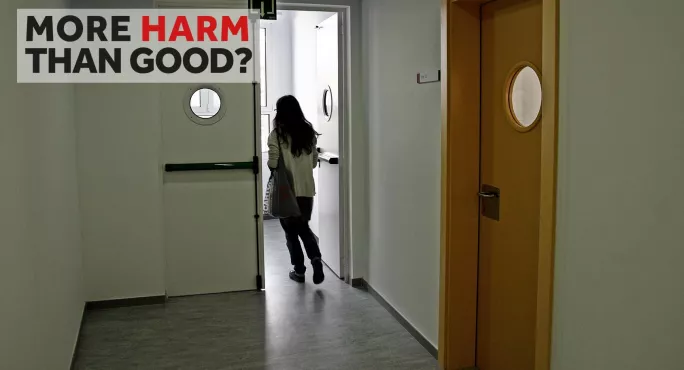- Home
- Exclusive: League tables and Ofsted ‘driving teachers out’
Exclusive: League tables and Ofsted ‘driving teachers out’

The school accountability system is driving good teachers out of the profession and putting them off working where they are needed most, according to the damning conclusions of a heavyweight education commission.
Tes can reveal that a major new report led by headteachers will warn that Ofsted inspections and government tables and targets are forcing teachers out and holding back improvement in the worst-performing schools.
Accountability systems designed to ensure schools perform well are actually causing widespread damage, according to a commission led by the NAHT heads’ union.
The hard-hitting report, to be published later this week, warns that headteachers are being forced to leave their jobs because either their school performance is judged to have dropped or because of the unmanageable workload they face through the pressure of school accountability.
The report also warns that good school leaders and teachers are unwilling to work in schools in the most challenging areas because of the fear that inspectorate and league tables will treat them unfairly.
Nick Brook, deputy general secretary of the NAHT, said: “We have a recruitment and retention crisis and the accountability system and the pressure it brings is one of the key reasons behind this.
“There are not the sufficient teachers and leaders coming into the system and staying.
“We know that the accountability system is forcing people to leave the profession and the leaders that there are in the system can be reluctant to go and work in the schools that need them most because of the pressures the accountability system brings.
“That is a double whammy for schools in the most disadvantaged circumstances.”
Mr Brook highlighted the findings of the NAHT’s Leaky Pipeline report, which he said showed too many experienced teachers were leaving the profession.
The report, based on a survey of 800 school leaders, found that two-thirds (66 per cent) of heads had seen teachers leave their profession before retirement with workload and work-life balance being the most common reason.
The new commission report warns that the school accountability system is failing in key ways.
It says: “To achieve greatness we need good people, in the right places, doing the right things. However, the accountability system is failing on all three counts.”
It warns that teachers are being driven out, deterred from working in disadvantaged schools and encouraged to take selfish decisions that are in the interest of the school but not the pupil.
The finding that school leaders do not want to work in the most deprived communities follows recent criticism levelled at Ofsted over schools in deprived areas being less likely to be judged to be “good”.
An Ofsted spokeswoman said: “Ofsted recognises that schools in deprived communities face real challenges in terms of both their pupil intake and access to improvement support. We recognise that challenge explicitly in our leadership and management judgement.
“However, when it comes to the overall judgement, parents and Parliament expect to us to report on the quality of education as we find it. The truth is that there are areas of the country where school performance is simply not good enough.
“The role of inspection in highlighting that underperformance is crucial if we are to ensure that these communities get the intervention and support they need to improve.”
A Department for Education spokesman said: “A strong accountability system is important for parents as it gives them information when picking the school that’s right for their children and gives schools essential information to help raise standards for their pupils - and standards are undeniably rising.
“The attainment gap between disadvantaged pupils and their peers has shrunk by 10 per cent since 2011 and there are 1.9 million more children in good or outstanding schools - an increase from 66 per cent of children in 2010 to 86 per cent now.
“However, we have repeatedly made clear that we want to ensure accountability is proportionate, helps to ensure standards in our schools are high and does not distract high-performing schools from what matters most - providing an excellent, broad and balanced education.
“Earlier this year the Education Secretary set out principles for a clearer accountability system and he has worked with Ofsted and union leaders to bust some of the myths around workload created by inspections so that teachers can focus on what matters in the classroom.”
The NAHT Accountability Commission also warns that the system gives few incentives for strong schools to offer support to those that are struggling.
The report adds: “Perhaps most concerning of all, it has celebrated and encouraged defensive and insular leadership behaviours that, if unchecked, will limit our capacity to improve.”
It the says an over-reliance on pupil performance data to judge school effectiveness means there is little incentive to put the interest of children with more complex needs first in decisions over admissions or exclusions.
The report adds: “At times, our system requires leaders to be brave and courageous in order to do the right thing for young people in the communities they serve. This needs to change so that doing the right thing is also the easiest thing to do.”
Mr Brook said: “ What became abundantly clear to me as I spoke to colleagues across the country as part of this review is that the fear of accountability has fundamentally changed how many leaders led their school, created workload and encouraged defensive behaviours.”
Keep reading for just £1 per month
You've reached your limit of free articles this month. Subscribe for £1 per month for three months and get:
- Unlimited access to all Tes magazine content
- Exclusive subscriber-only stories
- Award-winning email newsletters



